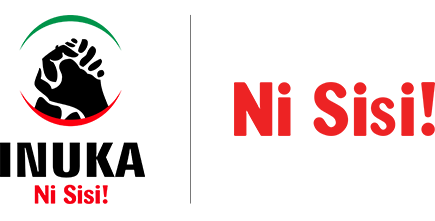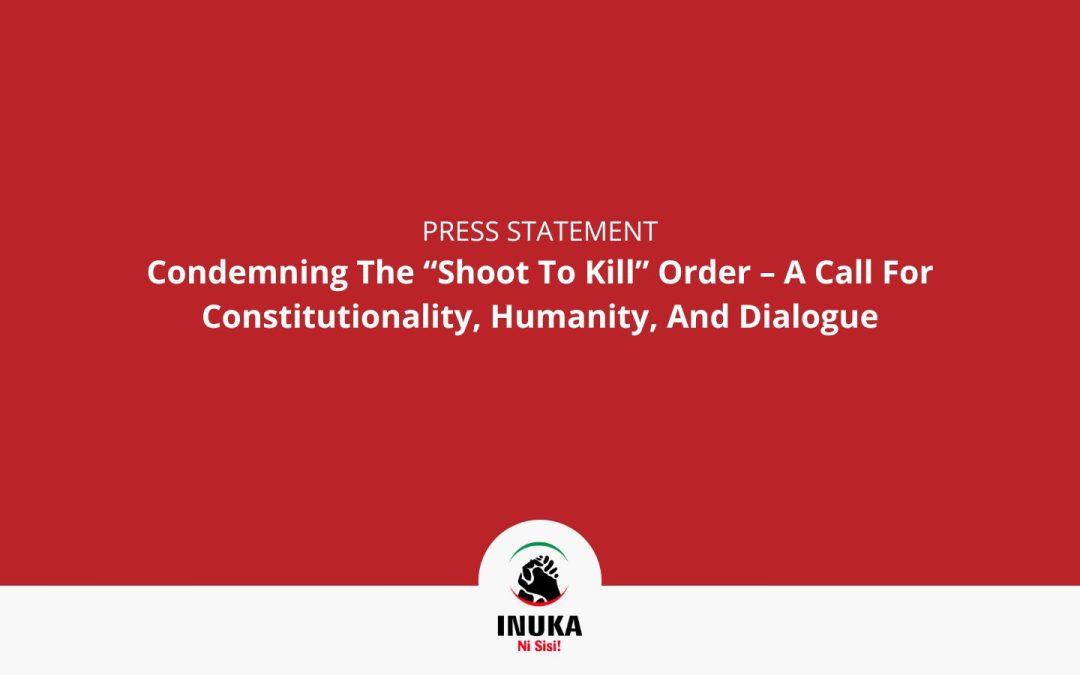
by Inuka Kenya | Jun 27, 2025 | Press Statements, Stories
We, the Nakuru County Civil Society Organizations, in partnership with Inuka Kenya ni Sisi, strongly condemn the dangerous and reckless remarks made by the Cabinet Secretary for Interior and national administration, Kipchumba Murkomen, who publicly instructed police to “shoot to kill” citizens accessing police stations if they happen to go close to them. This dangerous directive stands in direct opposition to the spirit and letter of our Constitution and violates the National Police Service’s own motto, “Utumishi kwa Wote” (Service to All). This motto is not a slogan to be printed on banners. It is a public promise. A commitment to serve every Kenyan with dignity, fairness, and respect.
Our observations during the 25th genz commemoration protest are as follows;
- Commendation for Police Restraint in Some Regions
We commend the professionalism and restraint demonstrated by some members of the National Police Service during the recent protests. In various parts of the country, law enforcement officers carried out their mandate under the Constitution, ensuring peaceful demonstrations proceeded without incidents of violence, vandalism, or destruction of property.
We particularly recognize the actions of the Officer Commanding Station (OCS) Ambrose Kyalo in Meru County-Imenti North, who walked side by side with protesters, assuring them of their safety and working to prevent any infiltration or escalation. In Mombasa County, efforts by politicians to disrupt protests by deploying hired goons were decisively thwarted by the police, safeguarding the integrity of peaceful demonstrations.
- Condemnation of Violence Against Police Officers
While we remain firm in condemning any form of police brutality and excessive use of force, we are equally disturbed by isolated incidents where protesters or criminal elements turned against police officers who were exercising restraint. Such actions are unacceptable and undermine the spirit of peaceful civic engagement. We urge the public to uphold nonviolence and dignity even in the face of provocation.
- Alarming “Shoot-to-Kill” Directive
We express our grave concern over reported directives or statements by Cs Murkomen, calling for a “shoot-to-kill” approach in managing protests. Such rhetoric is reckless, unconstitutional, and endangers the lives of innocent citizens. The use of lethal force is only permissible as a last resort and must always be preceded by lawful procedures and accountability mechanisms. We call for an immediate retraction of such statements and urge all leaders to respect the right to life as enshrined in the Constitution.
- Politically Sponsored Infiltration and Weaponization of Protests
We have witnessed incidents of politically sponsored goons who have infiltrated otherwise peaceful demonstrations to incite violence, loot businesses, and discredit the legitimacy of the Gen Z-led movement. This is a dangerous tactic that puts lives at risk and compromises public trust. We call on security agencies to investigate and hold accountable all those involved in such schemes.
- Clampdown on Media and Independent Reporting
We are deeply alarmed by attempts to intimidate, threaten, or shut down independent media houses and journalists covering the protests. A free press is an essential pillar of any democracy. Journalists must be allowed to operate without fear of harassment or censorship. We urge the government and all security agencies to respect press freedom and facilitate unhindered access to information.
The Gen Z protests are a wake-up call to the nation. They reflect a generation demanding dignity, justice, and genuine change. The government’s response must be rooted in dialogue, constitutionalism, and respect for human rights—not fear, violence, or repression.
We stand in solidarity with all Kenyans advocating for a better future and call upon all state and non-state actors to protect the civic space and uphold the rights enshrined in our Constitution.
Our Immediate Demands
- Immediate withdrawal and apology for the “shoot to kill” order.
- Halt the deployment of goons and respect the constitutional right to protest. 3. Institute national dialogue forums at county level with youth, civil society, and security agencies.
- Mandatory police training in human rights, trauma awareness, and crowd control. 5. Presidential assurance that protestors will be protected—not persecuted.
The solution lies not in bullets, but in listening. Not in denial, but in dialogue.
Issued by:
Nakuru County Civil Society Organizations & Inuka Kenya ni Sisi
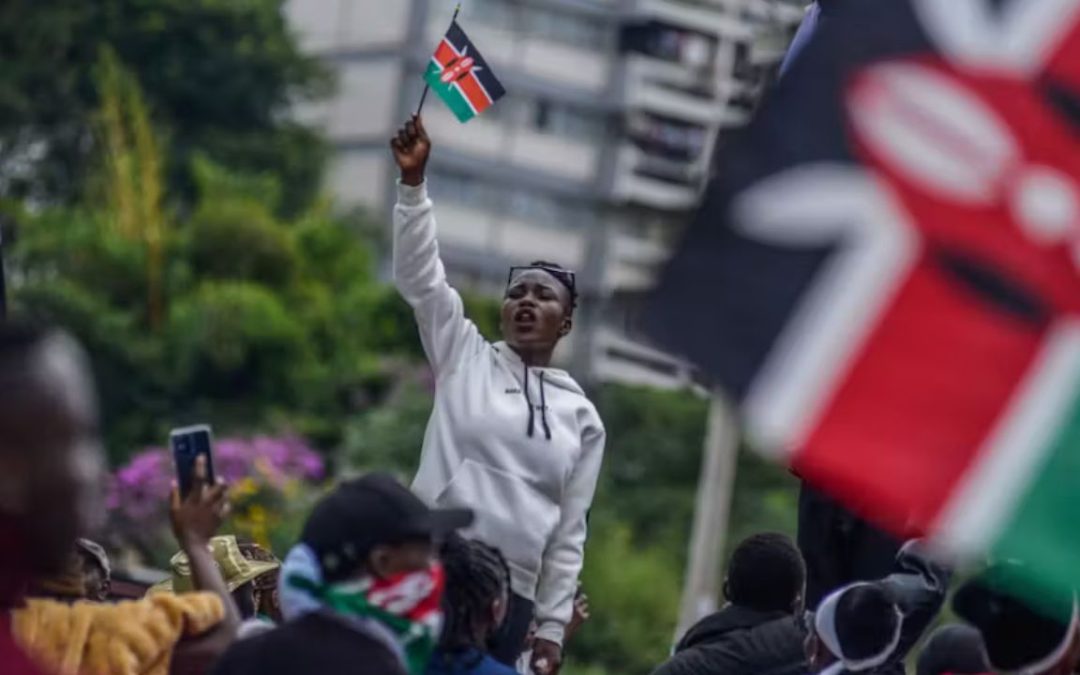
by Inuka Kenya | Jun 25, 2025 | Articles, Stories
Where did our humanity go?
That’s the question still hanging heavy in the air, one year since Kenya lost her young mashujaa-the Gen Z heroes who dared to dream out loud. They marched not with weapons, but with placards, water and phones. They carried flags, not stones. They sang for justice, not war. And yet, the State met them with rage.
June 2024 is etched in our history-not just as a protest, but as a heartbreak. As we mark one year since that turning point, we remember not just the fallen, but the fire they lit in all of us.
But this wasn’t the first time our nation tasted blood.
From the dark reign of President Moi, where whispers could get you jailed, to the early promises of reform under Kibaki, and into the digital resistance under Uhuru, one truth has remained: police brutality is deeply rooted in Kenya’s political soil. It did not start yesterday. It’s a shadow that has followed us for generations.
Back then, it was campus raids and Nyayo House torture cells. Today, it’s bullets to the chest and unmarked cars disappearing youth. What changed? Very little, except now, the victims are livestreaming their arrests. The nation is watching in real time.
And yet, we passed a Constitution in 2010. A people’s document. A promise of freedom. Of dignity. Of justice. We were proud. We thought we had arrived.
But in the alleyways of Dandora, the corners of Kayole, the fields of Isiolo, the coast of Mombasa, the estates of Kisumu, the hills of Meru, the towns of Kakamega, and the streets of Nairobi-young people are still dying at the hands of those meant to protect them. From Turkana to Kilifi, Embu to Eldoret, the same cries rise.
Where is our humanity?
We see police not as allies, but as threats. We fear the uniform. And it’s not just about the youth in the so-called “hotspots.” It’s nationwide. From highrise flats to remote villages, no one is safe from the State’s iron hand when it feels threatened by its own citizens.
And when Gen Z stood up,creatively, courageously, unapologetically, they reminded us what democracy should look like. They rejected tribal puppetry. They organized without politicians. They educated each other on the Constitution more effectively than civic education ever did. And they did it with humour, music, memes, and skits
But the cost was high.
We lost young lives. Bright minds. Unarmed warriors. Some were shot. Others were abducted. Many were tortured. And yet, they never picked up violence-they held onto dignity. That is utu. That is strength.
Police officers, too, are victims of a broken system,trained to obey, not to think. Many are poor, frustrated, and scared. But being a victim of the system does not justify becoming an agent of oppression. When the police protect power instead of people, the law becomes lawless.
So, as we remember the one-year mark since the Gen Z revolution took center stage, we ask: how many more must die before we fix the system?
This is not just a moment. It’s a movement.
It’s not just about Gen Z. It’s about Kenya.
If we continue to normalize brutality, we normalize silence. If we continue to bury the truth, we bury our future.
The Constitution wasn’t meant to gather dust. It was meant to be lived. To protect. To heal. To serve. We owe it to those we’ve lost to make it real.
Let this anniversary not just be about remembrance, but about recommitment. To justice. To truth. To utu.
Because when one Gen Z fell, a hundred more rose. And they are not backing down.
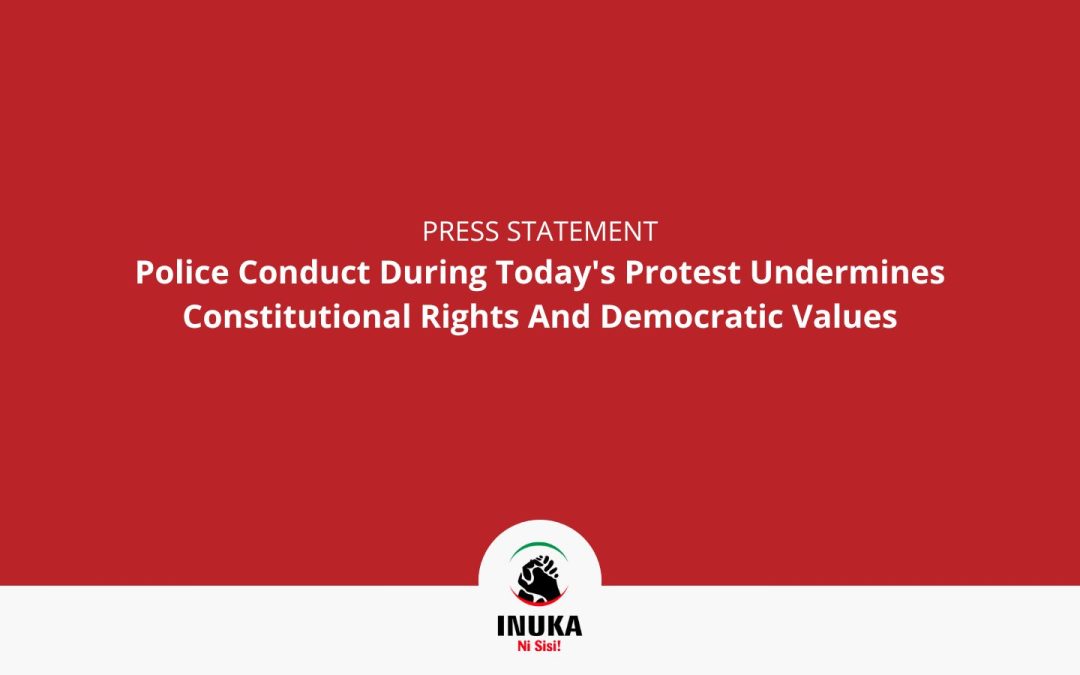
by Inuka Kenya | Jun 17, 2025 | Press Statements, Stories
Inuka Kenya Ni Sisi! strongly condemns the unlawful and excessive use of force by the National Police Service (NPS) during today’s peaceful protests held in Nairobi and other parts of the country. We are deeply disturbed by credible reports and footage showing officers using live ammunition, tear gas, and batons against unarmed civilians, many of them youth- who were exercising their constitutional right to assemble and express themselves peacefully.
This conduct is a blatant violation of the Constitution of Kenya, 2010. Specifically:
- Article 37 guarantees every person the right to assemble, demonstrate, picket, and present petitions to public authorities, peacefully and unarmed.
- Article 33 upholds the right to freedom of expression.
- Article 238(2)(b) provides that national security must be pursued in compliance with the law, with utmost respect for the rule of law, democracy, human rights, and fundamental freedoms.
- Article 244 obligates the National Police Service to “comply with constitutional standards of human rights and fundamental freedoms” and to “strive for the highest standards of professionalism and discipline.”
The deployment of brute force against protesters,many of whom were peacefully calling for transparency and accountability, is not only unconstitutional but also immoral. Instead of protecting lives and upholding public safety, the police have once again chosen intimidation, violence, and suppression as tools of engagement.
We are further concerned by the NPS’s failure to prevent or arrest individuals identified as “goons” who allegedly infiltrated protests with crude weapons, as mentioned in the police’s own press statement. This selective enforcement raises serious questions about possible complicity or negligence by security agencies. Peaceful protesters were met with violence, while those allegedly armed were left unbothered-why?
We therefore make the following demands:
- Immediate public release of the names of officers involved in today’s shooting and use of force. 2. We demand the arraignment of the shooter officer of the mask seller in court tomorrow.
- Independent investigations by IPOA and KNCHR into police conduct during the protests. 4. We demand the resignation of IG Kanja for gross incompetence
- Full respect for the Constitution and cessation of the use of live rounds and unlawful crowd-control measures.
- We demand the arrest and prosecution of DIG Lagat and all officers involved, in any way, in the murder of Albert Ojwang.
Kenyans are not criminals for demanding justice. Peaceful protest is not a crime. The Constitution is not a suggestion; it is the supreme law of the land.
We remind the police that they serve the people, not power.
Signed by,
Dr. Kawive Wambua
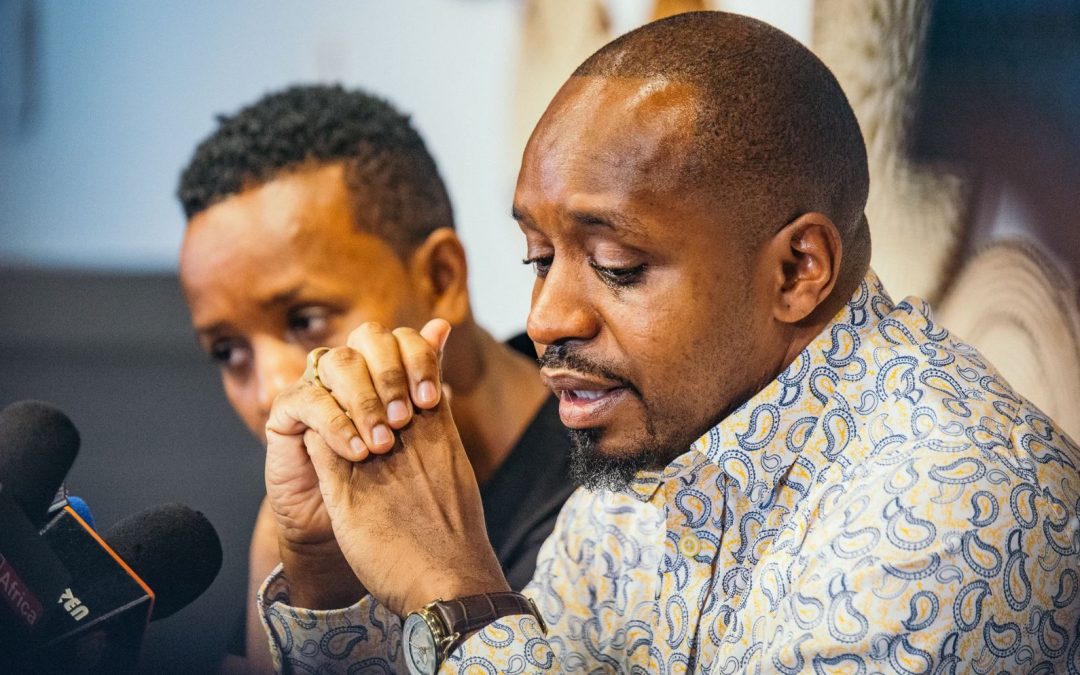
by Inuka Kenya | Jun 10, 2025 | Articles, Stories
This June, as we mark Men’s Mental Health Month, we’re confronted not just with statistics or awareness campaigns, but with the raw, painful truth of a real human story, the kind that forces us to pause and feel. It is the story of Boniface Mwangi, a man known for his courage on the streets, his fire in activism, and now, for a rare, unfiltered vulnerability that deserves our collective attention.
After traveling to Tanzania to stand in solidarity with Tundu Lissu, Boniface was arrested, blindfolded, taken to a secret location, stripped, and sexually assaulted. It’s a sentence that is difficult to write. Even harder to imagine. But Boniface chose to speak it, to name what happened, and in doing so, he broke the silence that imprisons so many men.
In a world where masculinity is still tied to stoicism and silence, where tears are swallowed and trauma buried, Boniface’s voice became an act of defiance — a powerful reminder that strength is not in hiding our wounds, but in daring to reveal them.
Too often, men suffer in the shadows. Fear, shame, and stigma silence them. And when they do speak up, especially about something as taboo as sexual violence, they’re met with disbelief or cruel jokes. But Boniface refused to shrink. He chose honesty over image. Pain over pretence.
His story is not just about what was done to him- it’s about what he chose to do with it. He reminded us that even the most outspoken among us can carry unspeakable pain. That behind every brave face might be a battle no one sees.
This isn’t just about Boniface. It’s about the countless men who’ve never told their stories. Who lie awake at night with panic attacks they don’t know how to name. Who flinches at touch. Who carry trauma as a secret weight, masked by anger or silence. For them, Boniface’s truth matters. It matters deeply.
At the East Africa Wellness Hub and in the Community, we want to do more than applaud him. We want to hold him, and every man like him, in a space of warmth, compassion, and fierce love. We want our community to be a place where men don’t have to be anything but human, where they can tremble and still be strong. Where they can cry and still be seen. Where they can say, “I need help,” and be met with, “We’re here.”
Boniface Mwangi
We see you.
We hear you.
We honor your courage.
Thank you for bravely sharing your pain with us and for challenging repressive and retrogressive cultural norms that silence so many. Your vulnerability is not just a personal act of healing- it is a powerful invitation to others.
You gave us permission to speak.
To feel.
To break.
To heal.
You cracked open a door-not just for yourself, but for countless men who have been afraid to name their pain, to confront it, and to begin the journey toward wholeness.
Your voice is a light. Your pain, shared, becomes a bridge. And your truth makes space for transformation.
We stand with you.
To every man reading this: You don’t have to carry it alone. You deserve to be loved, to be listened to, to be held, not just in moments of joy, but especially in your moments of unraveling. Vulnerability is not your weakness; it is your humanity. And it is beautiful.
This Men’s Mental Health Month, let’s do more than wear blue ribbons or post hashtags. Let’s sit with each other. Let’s ask, “How are you, really?” Let’s create spaces that welcome tears as much as laughter. Let’s teach our sons that strength isn’t in silence, it’s in truth.
And to Boniface: thank you for leading with your heart. May your healing be deep, may your courage ripple wide, and may you always know, you are not alone.
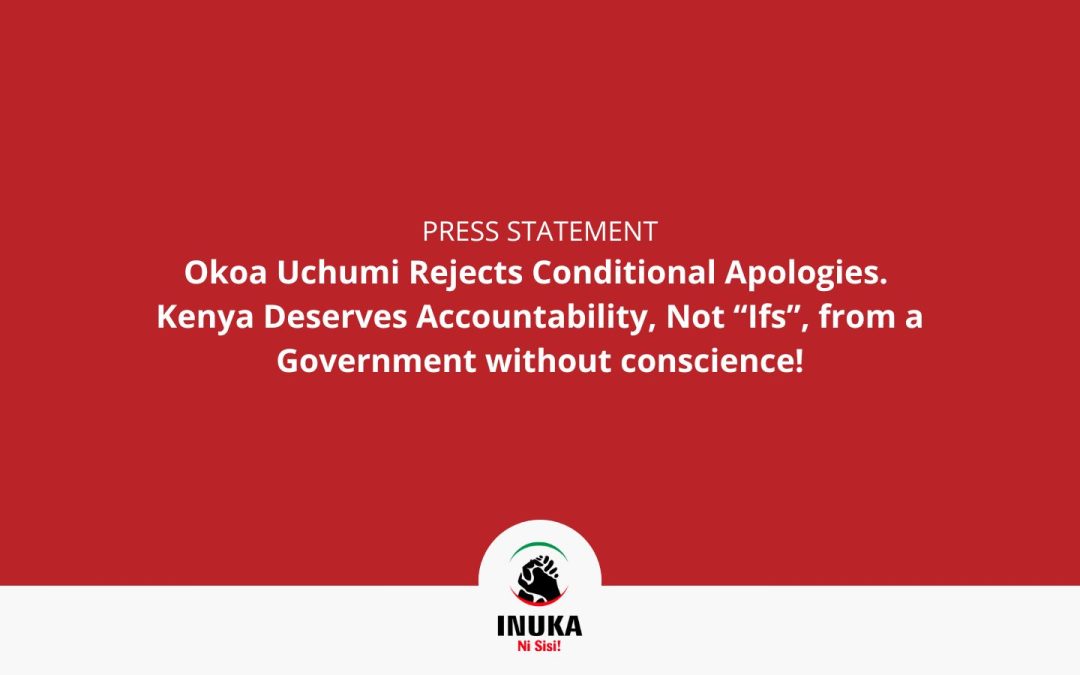
by Inuka Kenya | May 29, 2025 | Press Statements, Stories
We, the Okoa Uchumi Campaign, categorically reject the weaponization of conditional apologies. Kenya is not grieving in speculation. We are grieving that over 60 youth have been shot dead, another approximately 89 citizens abducted and disappeared, journalists and critics surveilled and threatened, neighbours’ sovereignty trampled on in cross-border impunity, budgets looted, priorities distorted and lives stolen.
During his address, President Ruto offered generalized apologies: “To our children, if there is any misstep, we apologize”. This Statement did not acknowledge the government’s actions: instead, the apology was well-framed in broad, non-committal terms without reference to concrete issues or a clear commitment to corrective action.
There is no “if” when the evidence is written in the wounds of a nation. It is unacceptable to pretend to provide redress conditionally. Most recently, we are angered by the government’s failure to defend citizens who are tortured and subjected to gross and inhuman treatment. In a self-preserving move the President of Kenya and the Chair of East Africa Community rushed to offer an apology to Tanzania without demanding accountability. It’s pretentious to believe the same mouth that denied accountability can now deliver justice to grieving Kenyans.
Our Demands Are Clear. Our Constitution Is Clearer!
Under Article 1 of the Constitution, sovereignty belongs to the people. Article 10 requires that governance be anchored in transparency, accountability, and human dignity. Additionally, Article 43 anchors the rights of every Kenyan to access education, health, housing, and social protection.
On the other hand, Chapter Six states that leadership must be based on integrity and public trust while remaining accountable to the people of Kenya. The provisions are not aspirations: they are the law, which is equal to a creed in a religious setting. Therefore, a breach is a betrayal and must be met with serious actions of accountability and responsibility. Therefore, we ask:
- When will justice begin for the youth murdered during peaceful protests while rogue police officers continue to walk free, even as graves remain unmarked and questions unanswered?
- Where is the inquiry into enforced disappearances and abductions?
A Budget of Betrayal
This year’s budget is not a People’s Budget. It cuts funding for our children but balloons spending for the presidency. Clearly, we do not have a revenue problem, but an expenditure problem. As if that is not enough, the budget mocks the sovereignty of the people and offends intergenerational
equity by slashing education, child services, contraceptives, and public health, yet triples budgets for security, surveillance, and elite comfort. It offends our elderly and vulnerable, while feeding a bloated bureaucracy. It again presents a faulty deficit that will cause our Kenyan suppliers to go
without payment due to Ksh.706 billion worth of pending bills and debt repayments for interest and principal amount well above Ksh.1.9 Trillion.
Do we still need to discuss debt restructuring and default despite the government clearly lacking the ability to pay local suppliers, pensioners, and essential services? We are already in debt default. Isn’t this what the basics of insolvency are?
Finally, we want to state that we are tired of apologies served at prayer breakfasts; we do not swallow them. We are ashamed of expensive ceremonies that produce no justice, and ultimately, we are fed up with leaders fluent in the language of faith but deaf to the cries of the people.
Okoa Uchumi Calls For:
- The Government to proactively engage with regional counterparts to ensure the safety, dignity, and protection of all Kenyans. Defend Citizens Across Borders: As Chair of the East African Community, the President must take a firm stance when Kenyan citizens face mistreatment in neighbouring countries.
- A national inquiry into extrajudicial killings, disappearances, and state violence, led by independent actors and victims’ families and immediate redress and reparations for victims of economic and political violence.
- Transparent audits of public debt and identification of odious loans as per the High Court ruling of December 2024, and a people-led renegotiation process.
- Criminal investigations into grand corruption cases in digital infrastructure, housing, health, land, and other captured sectors.
- Restoration of social sector budgets — health, education, child services, contraceptives, and social protection — as non-negotiable economic rights.
- Full implementation of Chapter Six and Article 10, starting with public vetting and lifestyle audits of those in office.
This campaign is not against Kenya. It is for Kenya — a Kenya where leadership is accountable, budgets serve people, and justice is not mumbled in prayers but written into policy, practice, and public life.
For more information email: mulayi.muni@tisa.or.ke
Page 2 of 12«12345...10...»Last »

